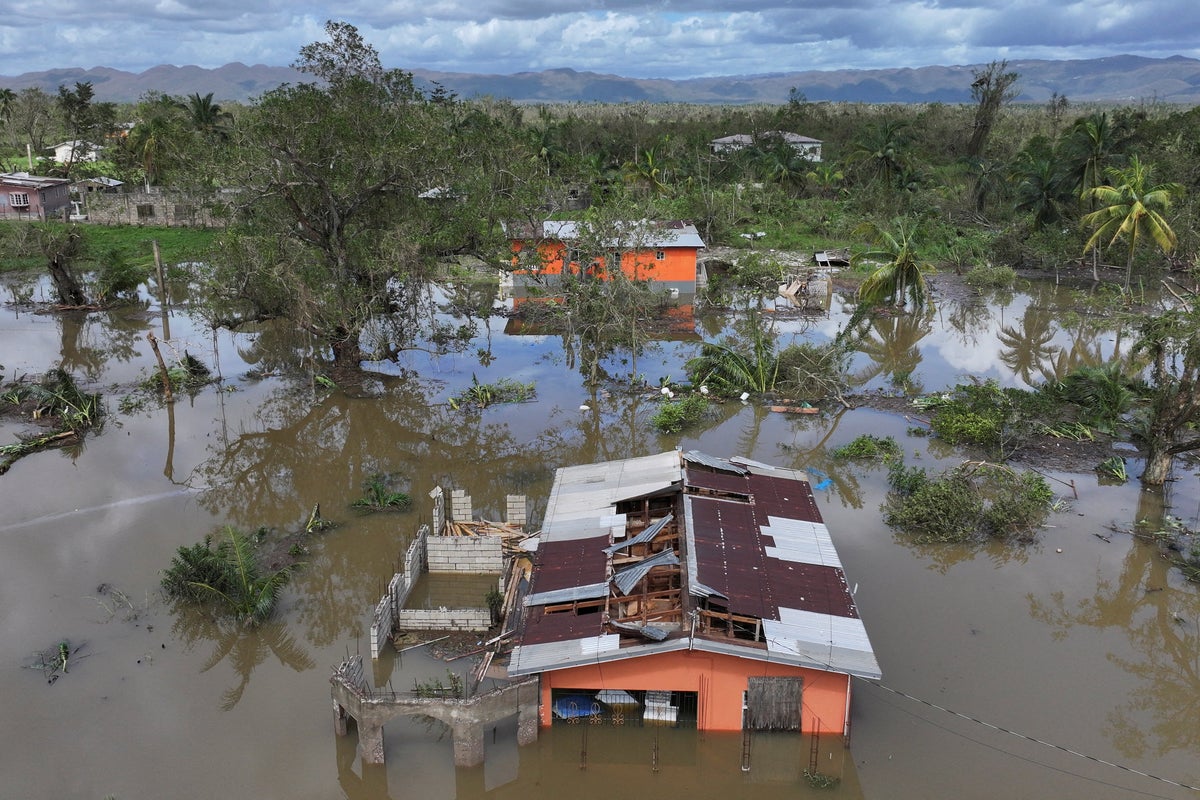
Britons have spoken of their fears for relatives in Jamaica after the “storm of the century” barrelled through the Caribbean island, leaving a trail of flood and destruction.
Melissa struck Jamaica on Tuesday as the strongest-ever hurricane to directly hit its shores, with sustained winds of 185 mph. The category 5 storm battered hospitals, tore through an airport and swamped whole towns underwater, even unleashing the threat of displaced crocodiles.
The death toll climbed on Thursday with four fatalities confirmed as people dug from the rubble in the wake of the storm’s devastation. As the storm ploughed through the northern Caribbean on Wednesday and Thursday, a further 25 people were confirmed dead in Haiti.
More than 25,000 people remained crowded into shelters across the western half of Jamaica, with 77 per cent of the island without power. Tens of thousands of tourists remain stranded, including 8,000 Britons.
Prime minister Andrew Holness said up to 90 per cent of roofs in the southwest coastal community of Black River were destroyed, calling it “ground zero”.
“The people are still coming to grips with the destruction,” he said.
Mickeal Akinsete, 30, said he is “extremely worried” for his relatives in Jamaica. His grandmother lives in St Andrew’s parish in Kingston- which was spared the worst of the damage- but also has relatives in the severely affected areas of St. Elizabeth and Black River.
“It has been an extreme struggle to reach out to them. It is very distressing seeing those scenes on TV. We feel powerless. There aren’t words to describe it.”
Mr Akinsete managed to speak with his grandmother on Thursday morning, but has not heard from most of his relatives since Monday morning.
The fintech consultant from London said St Elizabeth is “unrecognisable” from aerial shots, which show the parish submerged in water.
“Even once we manage to communicate with them, it’s about what we are going to do moving forward. Family members have local businesses there,” he said, adding: “Hurricanes happen in Jamaica often but we have never seen anything like this.”
Bertram Banton and his wife Kareen Lily Banton, were on holiday in the northern coastal town, Ocho Rios, when the hurricane hit.
“I have never heard sounds like that before,” the Birmingham-based bus driver told The Independent. “At one point, I tried to open the door to take a peep. But I ran back inside- the noises that thing was making. It sounded like a tractor engine.
“I’ve never heard such sounds from the wind. Not even our musicians at church can play those notes.”
The couple are meant to fly home to the UK on Saturday, but have been advised by TUI that their flights may be delayed by two days.
Dr Beverly Lindsay OBE, chair of the Association of Jamaican Nationals (Birmingham) UK, said communication with friends and family in Jamaica is “slowly opening up” as power gradually trickles back on.
“People are devastated of course, some people have lost their homes and unfortunately are not insured. We are trying to send whatever support we can out there to them,” she told The Independent.
But speaking more optimistically about the strong spirit of the communities there, she said: “Jamaicans are maintaining high spirits.” Despite the catastrophe, “they are hopeful”.
The UK government announced on Thursday that it has chartered flights to help British nationals leave Jamaica in the wake of the hurricane.
British nationals should use commercial flights as their first port of call to leave the country, the Foreign, Commonwealth and Development Office (FCDO) said.
The government will release a form for those affected to register for the flights, and all British nationals who have already registered being in Jamaica will automatically contacted, the FCDO said. It asked all Britons in Jamaica to register that they are there.
The UK is also supporting Jamaica with £2.5 million in emergency humanitarian funding, as Sir Keir Starmer described scenes from the country as “truly shocking”.
This funding will support a rapid humanitarian response, including the delivery of emergency supplies such as shelter kits, water filters, and blankets, to help prevent injury, and disease outbreaks.
These emergency relief supplies have already been prepositioned in Antigua to ensure they can be rapidly deployed to where they are needed most. UK humanitarian and technical experts are also being deployed to the region to assist with the coordination and delivery of aid.
